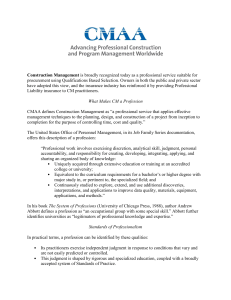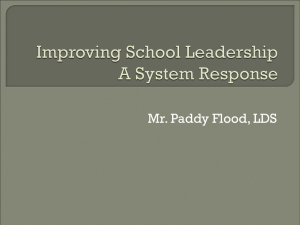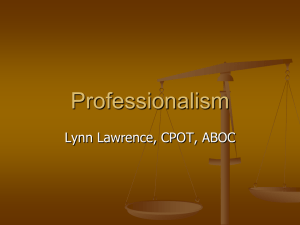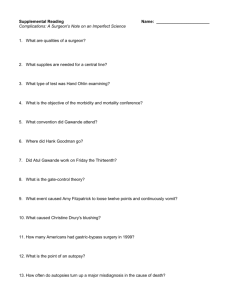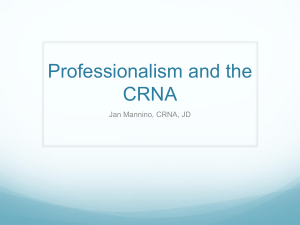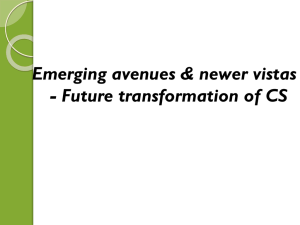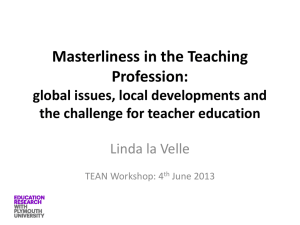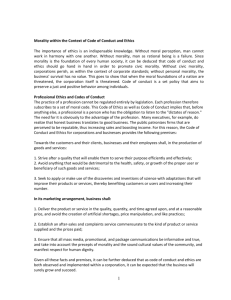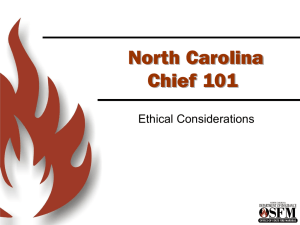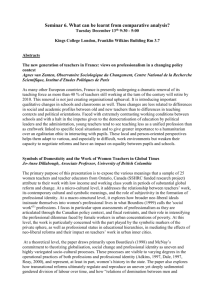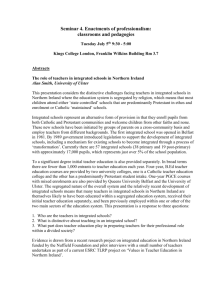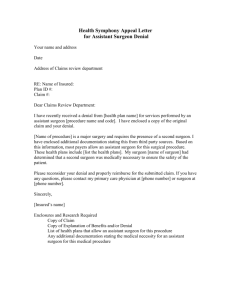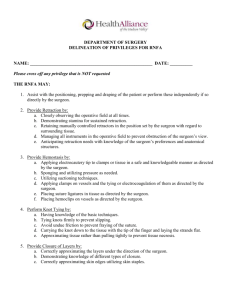ST310_Professionalism_BB
advertisement
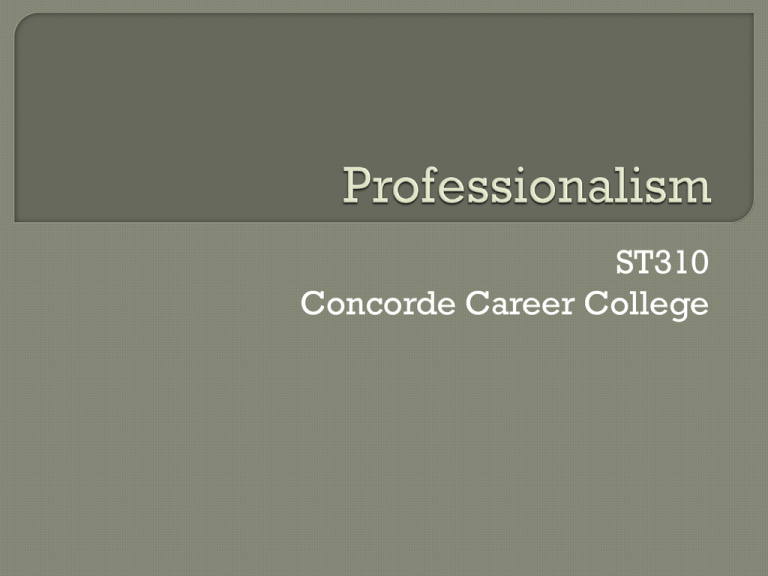
ST310 Concorde Career College What does it mean to be a member of a profession? • From the Latin professio, which means a public declaration with the force of a promise. University of Washington School of Medicine, 2011 Professions are groups which declare in a public way that their members promise to act or behave in certain ways and that the group and the society may discipline those who fail to do so. The profession presents itself to society as a social benefit and society accepts the profession, expecting it to serve some important social goal. The profession usually issues a code of ethics stating the standards by which its members can be judged. The traditional professions are medicine, law, education and clergy. University of Washington School of Medicine, 2011 Is a profession different that a business? If so, how? Professionals engage in business but… • They have fiduciary duty • What is our fiduciary duty? http://www.ast.org/st ate_assemblies/docu ments/ST_Jun07_Cod eofConduct_000.pdf http://www.ast.org/a boutus/documents/A ST_Code_of_Ethics.p df • Adopted 2007 The conduct, aims, or qualities that characterize or mark a profession or a professional person Merriam-Webster, 2012 Trustworthy Competent Respectful Considerate Empathetic Dependable Acts with Integrity Courteous Cooperative Committed Teachable Accountable How Are do others perceive our actions? we being professional? How do we leave a professional impression on our peers and colleagues? How do others judge our level of professionalism? Are we building a reputation for ourselves? If so, What type? We are judged by our… • • • • • • • • • Behavior Attitude Demeanor Communication Body Language Values Interpersonal skills Appearance Hygiene How is our level of professionalism measured? • Against standards and guidelines Hospital policy, compliance, professional organizations, scope of practice, job description • Standard of care • Surgical conscience • Professional ethics • Competence and Skill Professionalism the eye of the beholder! is in What does an unprofessional person look like? What do they act like? Ultimately, these individuals do not conform to the standards of the profession. What expectations do other perioperative professionals have of us? What expectations does the facility have? What about the patient’s expectations? At what point do you cross professional boundaries? How can those boundaries be crossed? • • • • • • • • Communication Relationships Self Disclosure Exploitation Breach of confidence Negligence Apathy Lack of team work Why are boundaries important in the first place? As surgical technologists, why are we at work in the first place? Aeger Primo! How do you keep your personal baggage out of the workplace? • Balance of work and personal life Time management • Stability • Priorities • Re-examine your personal life • Expect the unexpected! What about emotional baggage? • Stability • Outside outlet Deal with frustration constructively While you’re waiting for the anesthesiologist to sedate a middle-aged patient scheduled for a colectomy, the attending surgeon walks in and announces that he has some music to play. You’re startled to hear police sirens and profanities coming out of the CD player. The music is loud and vulgar. While you prepare the patient, you’re shocked by the liberal use of profanity, racial slurs, and derogatory statements in the lyrics of the song. You look at others members of the operative team to gauge their reactions. They go about their work, shaking their heads or rolling their eyes. The surgeon steps out to scrub. Bruce, 2012 Is this behavior unprofessional, and if so, how? What would you do? • Excuse yourself from the OR • Turn down the music while the surgeon is out • While the surgeon is out, inquire how others feel and develop a collaborative approach • Don’t say anything at all • Confront the surgeon directly Susan is a student who often posts Facebook status updates about her experience in the OR and sometimes these comments include funny anecdotes. Examples include: “Wow, don’t you think that most people would come to the doctor before their toes fall off?” or “You know you need to lose weight when we can’t get you on the operating table.” Bruce, 2012 Is this appropriate? Why or why not? Has social media impacted professional behavior? If so, how? You observe a medical mistake during a procedure in the operating room. “The error does not result in the patient’s death, but requires the patient to extend his stay in the hospital several days. In addition, the postoperative pain experienced by the patient is more significant than it would have been otherwise. The attending physician informs the patient that there was a complication during the procedure, but does not specify that it was secondary to his error. How do you respond? JAMA, 2001 How do you respond? What if you are a student, does this change things? You never get a second chance to make a first impression! Sell yourself! Activity: http://www.drexel.edu/scdc/resources/s amples/Interviewing/Thirty%20Second %20Commercial%20Worksheet.pdf




